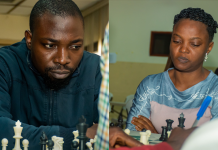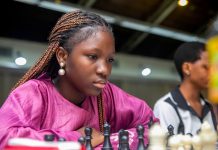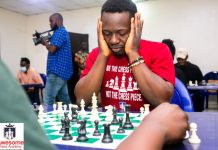The book launch of the Book : Reflections on Chess in the Rainbow Nation Volume 4
Tribute to Rodney Williams By Dr Lyndon Bouah and Marc Petersen took place yesterday afternoon at SAPS Head Office in Pineland
Lt Colonel Sciocatti stated
I first met Rodney Williams, then a Warrant Officer in the SA Police Services, during 2011 when he joined the SAPS Western Cape Chess fraternity. At this stage, I was informed that he was an extremely good chess player and this was soon evident when he made the Provincial team to participate in the SAPS National Championships in Mpumalanga in 2011.
I immediately took note of his calm and collective manner in which he approached us. Although he was noticeably a much better chess player than the rest of the SAPS Western Cape players, he never boasted nor was he arrogant in showing it. He immediately made a favourable and likeable impression on all the SAPS chess players. His knowledge of the game of chess was way above the rest of the players and he would always assist in improving their knowledge of chess.

He was part of the Western Cape SAPS chess team since 2011 and was the SAPS National Individual Chess Champion from 2011 to 2013.During this period he succeeded in dethroning a longstanding champion, Mr Rasweu Mofokeng, of Free State. This in itself was an excellent achievement and also assisted the Western Cape SAPS Team to consistently finish on the podium where they obtained the gold medal in the team event during 2011 and silver in 2013 and 2014.
Mr Howard Fisher who was an old school friend attended the launch and said the following:
Rodney first saw a chess board in 1984, he was 14 years old, and attending Strandfontein Senior Secondary School. His family had moved from Hanover Park to Strandfontein in 1979. Rodney watched his neighbours play this fascinating game. The Fisher boys had borrowed the set from a cousin who lived two roads away.
The next few months saw Rodney and I borrow the set and play more than 50 games every day. Both of us were novices, and the score was always 50 – 0 in my favour. This prompted Rodney to search the mobile library, a truck filled with books, which visited
Strandfontein every Tuesday, for any books on chess that would help him turn the tide. He found a beginner’s book on chess tactics
Here he learned about forks, pins and skewers. He also discovered the Scholars Mate. Suddenly, the tide started turning. He was now winning more than 10 games out of the 50. Rodney joined the school chess club, hosted by Mr E. G. Lawrence, the mathematics teacher. Lawrence was a strict disciplinarian, and he took to Rodney’s enthusiasm for the game.
The lack of chess materials and books was a hindrance to the development of chess on the Cape Flats. Mr Lawrence then wrote to Nigel Short, the recently crowned British Grandmaster (1984). Nigel Short sent back two boxes filled with chess sets, magazines and books.
Lawrence gave Rodney a set to take home. Rodney built a table with scrap wood and had a permanent place of prominence for his chess set.
The games between Rodney and I were now taking much longer, and the 50 games were now only 10 a day, and on a magnificent board, not the smaller magnetic travel set. Then the day came, 6-4! Rodney won!

Advocate Maxwell Solomon the reflected on his relationship with the late Rodney Williams and reminded the audience that Rodney Williams will perhaps best be remembered for the inspiring legacy he has left within the chess ranks of SAPS, both provincially and nationally. In this book we will come to know how after nearly a decade of a hiatus from chess, Rodney Williams literally burst onto the SAPS chess scene in 2011 and proceeded to win the individual SAPS Western Cape for three consecutive years between 2011 and 2013 and also contribute to the SAPS Western Cape medal placement at the National Chess Championships.

A particular highlight seems to be his Fischer-like performance at the 2012 SAPS National Chess Championship where he scored a full house 7/7. In this book we will come to learn the names of his fellow combatants, such as Rasweu Mofokeng, Ernst Vermeulen, Rico Schutte, Melvin Lucas, KJ Twaile, A Goddard, T W Letlape, Sipho Mahlangu, V Seleka, and others. In those same three years Rodney
Williams helped the SAPS Western Cape team win or medal in the SAPS National Team Chess Championships where he also took the gold medal on board 1.
This book will reveal Rodney Williams’ humility, calm demeanour, camaraderie, and his willingness to share his knowledge freely with his fellow competitors during these championships. We will also learn how Rodney Williams contributed to the development of chess in SAPS, and how he inspired his fellow competitors to improve their level of play.

The two co-authors then reflected on their journey with Rodney Williams and reminded the audience that Rodney Williams was a champion and a gentleman in all respects. He loved his chess and played fearlessly and was not afraid to sacrifice a piece or pawn when needed. He played at schoolboy levels and achieved top honours and then later achieved honours with his club, Mitchells Plain, and then became Western Province Champion in 2001 with the crowning glory being his three consecutive titles at SAPS National Level and obtaining his South African Police colours when he participated in the SARPCCO Games in the Democratic Republic of Congo.
Rodney brought to the SAPS ranks his scholarship of the game. He studied the opening, middle-game and endgame. He insisted on trying to perfect all aspects of his game and this rubbed off on his opponents. They knew that they needed to play hard to beat Rodney in all phases of the game. Rodney had a deep love for chess. From those early days with Howard Fisher in Strandfontein, to his days in Namibia and elsewhere, Rodney was constantly improving himself and improving his game.
Rodney had a flair for the game which was recognised by his teammates very early on at Mitchells Plain. GM Kenny Solomon knew that Rodney was a solid and dependable player who understood the mechanics of pawn structures and could hold his own. Rodney was very creative and was not afraid to sacrifice or do whatever the position demanded. This understanding was critical as it allowed him to be a pragmatic player. He could take on anyone and even if he was worse, he would still try to create chances and counterplay.
The wife of Rodney Williams, Mrs Estelle Williams, thanked everyone for attending the launch and sharing their memories with Rodney. She reflected on the late Rodney’s passion for the game. She also accepted on behalf of her family the certificate signed by Minister Anroux Marais from the Department of Cultural Affairs and Sport. The certificate acknowledged the sportspersons who died during the Covid pandemic in the Western Cape.
The book is available from Dr Lyndon Bouah on Lyndon.bouah@gmail.com or 071 363 1306 or Marc Petersen on 084 277 5208
















